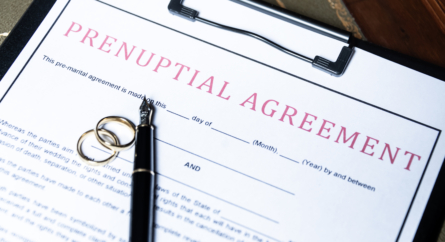10 Things to Know About Prenups and Postnups
Prenuptial and postnuptial agreements may be associated with celebrities and extremely wealthy individuals – but they’re for everyone! In fact, a 2023 poll by Axios/Harris found that over 50% of American adults polled said they were open to signing a prenup. If you’re considering a prenup or postnup, it’s important to do it the right way to ensure it is valid and enforceable. Here are ten things to know about prenups and postnups.
10 – Start early!
For a prenup, don’t bring up the topic for the first time a few weeks before your wedding date. It’s important to take time to discuss what you and your intended spouse want the prenup to achieve, to hire counsel, and to take time to review, consider, and fully understand the specific language in the agreement before signing it. Ideally, bring it up before you even get engaged. It’s harder to consider your interests in signing a prenup, or to refuse to sign one at all, once the engagement ring is already on someone’s finger!
9 – You probably need a prenup.
Even if you don’t have significant wealth now, many marriages end in divorce, and a prenup can help simplify that process by addressing non-child-related issues like division of assets and debts, and alimony. It can also protect gifts or inheritances received during the marriage in the event of divorce. Significantly, it can also protect you from liability for your spouse’s debts in the event of divorce.
8 – A prenup must be “fair and reasonable” at the time of execution and “not unconscionable” at the time of divorce.
A postnup must be “fair and reasonable” both at the time of execution and at the time of divorce. An experienced family law attorney can help you ensure that the terms you’re agreeing to will be considered fair and reasonable, which helps ensure the agreement is valid.
7 – If a prenup or postnup is invalid or unenforceable at the time of divorce, a court will apply the current law to any claims for division of assets and liabilities or alimony, as though the agreement didn’t exist.
This can result in significant alimony payments, liability for one another’s debts, and division of all assets held by either party, including gifted and inherited assets – and in a long-term marriage, this could mean an equal division of all assets the spouses hold, regardless of how they acquired them.
6 – Prenups can save you money.
You’ll pay for lawyers to negotiate and draft the agreement, but the legal fees can be significantly less because you’ve already dealt with some significant issues that won’t need to be renegotiated if you divorce.
5 – A prenup is signed before the marriage, while a postnup is signed after marriage.
Because the spouses are already married when signing a postnup, some different considerations apply. After all, neither party has the option to simply refuse to get married like when signing a prenup, which means they’re giving up rights that they already have. If the knot hasn’t been tied yet, walking away is much easier.
4 – Prenups and postnups can address how assets will be handled in the event of death, protecting children from previous relationships and ensuring they receive the funds their parents intended at the time of their death.
In the absence of a prenup or postnup, a surviving spouse could challenge the will in Court and seek to disinherit children from the prior relationship in the spouse’s favor.
3 – Prenups and postnups are becoming more common.
This may be due to marriages occurring later in life than they did previously, after spouses have started a career and begun to build their own wealth. Prenups and postnups are an effective way to protect that wealth, as well as wealth acquired in the future, if they’re done well.
2 – Prenups and postnups must be in writing.
No verbal agreement would ever be upheld by the Court.
1 – Each spouse should retain independent counsel in connection with any prenup or postnup.
Without independent counsel, there is a significantly higher chance that the prenup or postnup will be determined invalid and unenforceable. You want your prenup or postnup to be worth the time and effort that went into it.
If you need assistance with creating your prenup or postnup, please contact your Bowditch attorney.
Categorized: Postnuptial, Prenuptial
Tagged In: divorce, postnuptial agreements, prenuptial agreements






